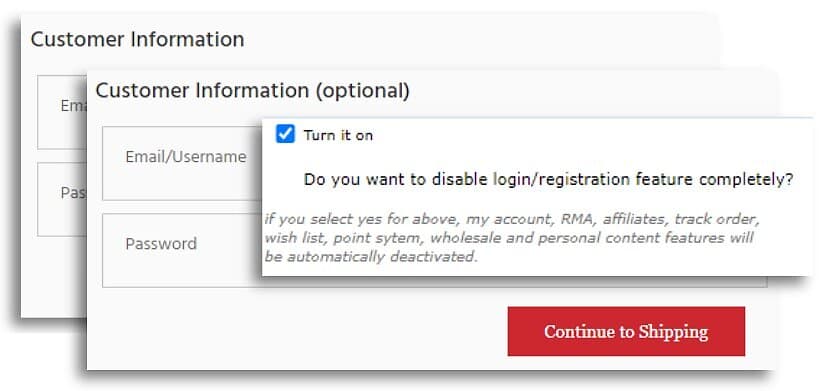

The Pros and Cons of Checkout Without Registration for Your Online Store
Find out if you should turn this feature on for your online store.
Checkout without Registration makes for faster checkout but at a cost.
[Video Tutorial Coming Soon]
In the fast-paced world of e-commerce, providing a seamless and user-friendly checkout experience is crucial for online stores. One way to streamline the process is by offering checkout without registration, allowing customers to make purchases without creating an account. In this article, we will explore the pros and cons of this approach, considering its impact on online stores, web stores, and e-commerce stores.
Pros of Checkout Without Registration
Enhanced User Convenience
One of the primary advantages of checkout without registration is the convenience it offers to customers. By eliminating the need for creating an account, shoppers can save time and complete their purchases swiftly. This frictionless process is particularly appealing to first-time visitors or customers who prefer a more efficient shopping experience.
Reduced Abandoned Carts
The registration process can often be a hurdle for potential buyers, leading to cart abandonment. By allowing checkout without registration, online stores can significantly reduce the number of abandoned carts. Simplifying the process removes barriers and increases the chances of conversion, positively impacting sales and revenue.Increased Customer Reach
Checkout without registration opens up the opportunity to attract new customers who might otherwise abandon their purchase due to the registration requirement. By offering a guest checkout option, online stores can capture leads and convert them into paying customers. This broadens the customer base and can lead to potential repeat business.
Lower Development and Maintenance Costs
Implementing and maintaining a registration system for your online store can be resource-intensive. By opting for checkout without registration, you can reduce development costs and ongoing maintenance efforts. This allows you to allocate resources to other crucial aspects of your e-commerce business, such as marketing, customer support, or product development.
Cons of Checkout Without Registration
Limited Customer Data Collection
One of the downsides of checkout without registration is the reduced amount of customer data you can collect. Registering users enables you to gather valuable insights, such as demographic information, purchase history, and contact details. Without registration, your ability to personalize marketing efforts or offer tailored recommendations may be compromised.

Missed Opportunity for Account Creation
Registration provides an opportunity to create customer accounts, fostering long-term relationships and enabling personalized experiences. With checkout without registration, you miss out on the chance to encourage customers to create accounts for future purchases, loyalty rewards, and exclusive benefits.
Guest Checkout Limitations
Guest checkout options typically offer limited features compared to registered accounts. For example, customers may not have access to order tracking, order history, or the ability to easily reorder items. This lack of functionality may result in a less comprehensive and satisfying shopping experience for some customers.
Higher Risk of Fraud
Checkout without registration poses a higher risk of fraudulent activities since users' identities are not verified through the account creation process. Fraudsters can take advantage of guest checkout options to place fraudulent orders without leaving a trace. Implementing additional security measures, such as CAPTCHAs or fraud detection tools, becomes crucial to mitigate these risks.
Conclusion
Checkout without registration offers numerous advantages to online stores, web stores, and e-commerce businesses, including enhanced convenience, reduced cart abandonment, increased customer reach, and lower development costs. However, it also comes with certain drawbacks, such as limited customer data collection, missed opportunities for account creation, guest checkout limitations, and higher fraud risks.
Ultimately, the decision to offer checkout without registration should be based on your specific business goals and target audience. Striking a balance between user convenience and data collection, while implementing necessary security measures, can help you optimize your online store's checkout experience and maximize customer satisfaction.
Remember, understanding your customers' preferences and providing options that cater to their needs is crucial for building a successful and customer-centric online store, web store, or e-commerce business.